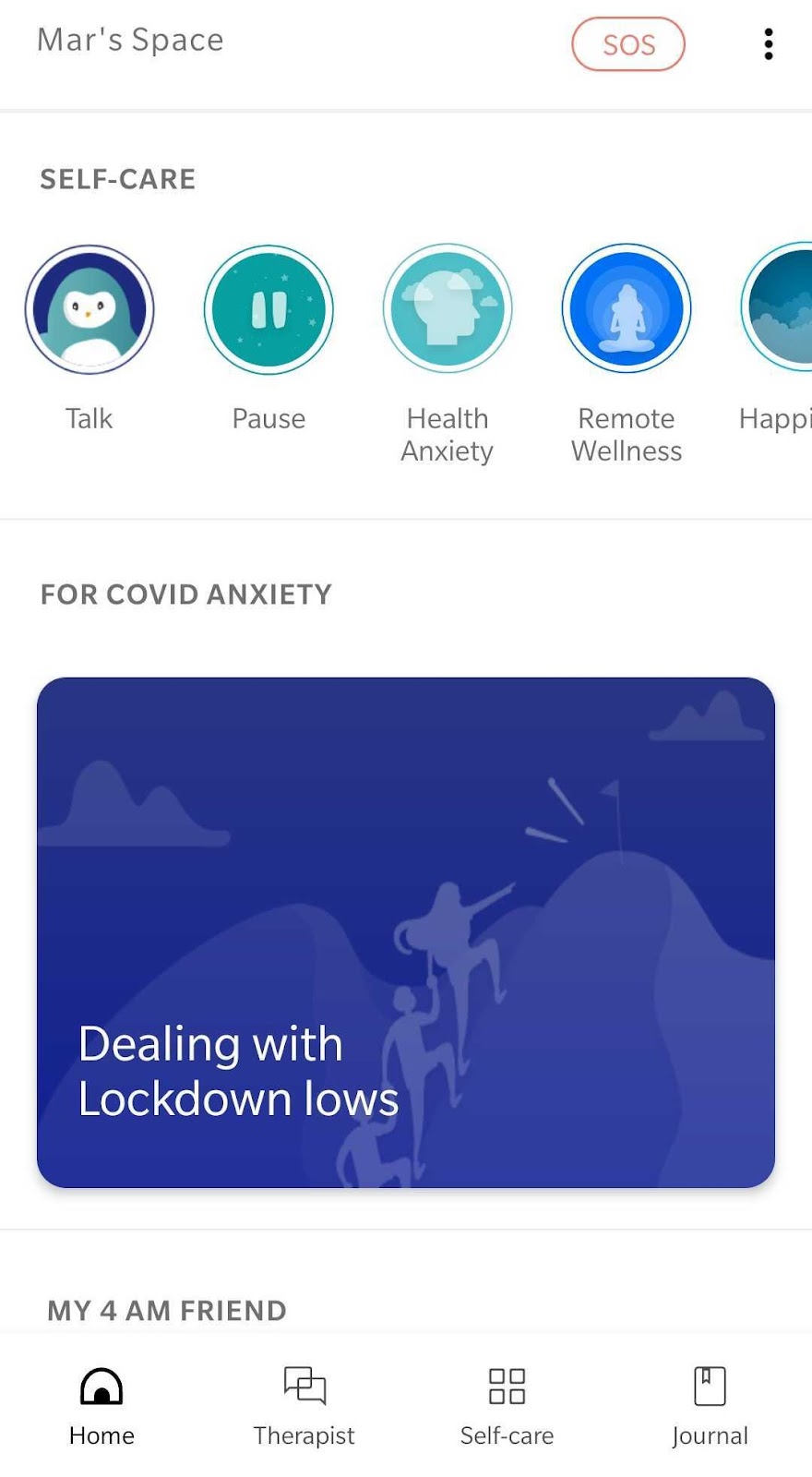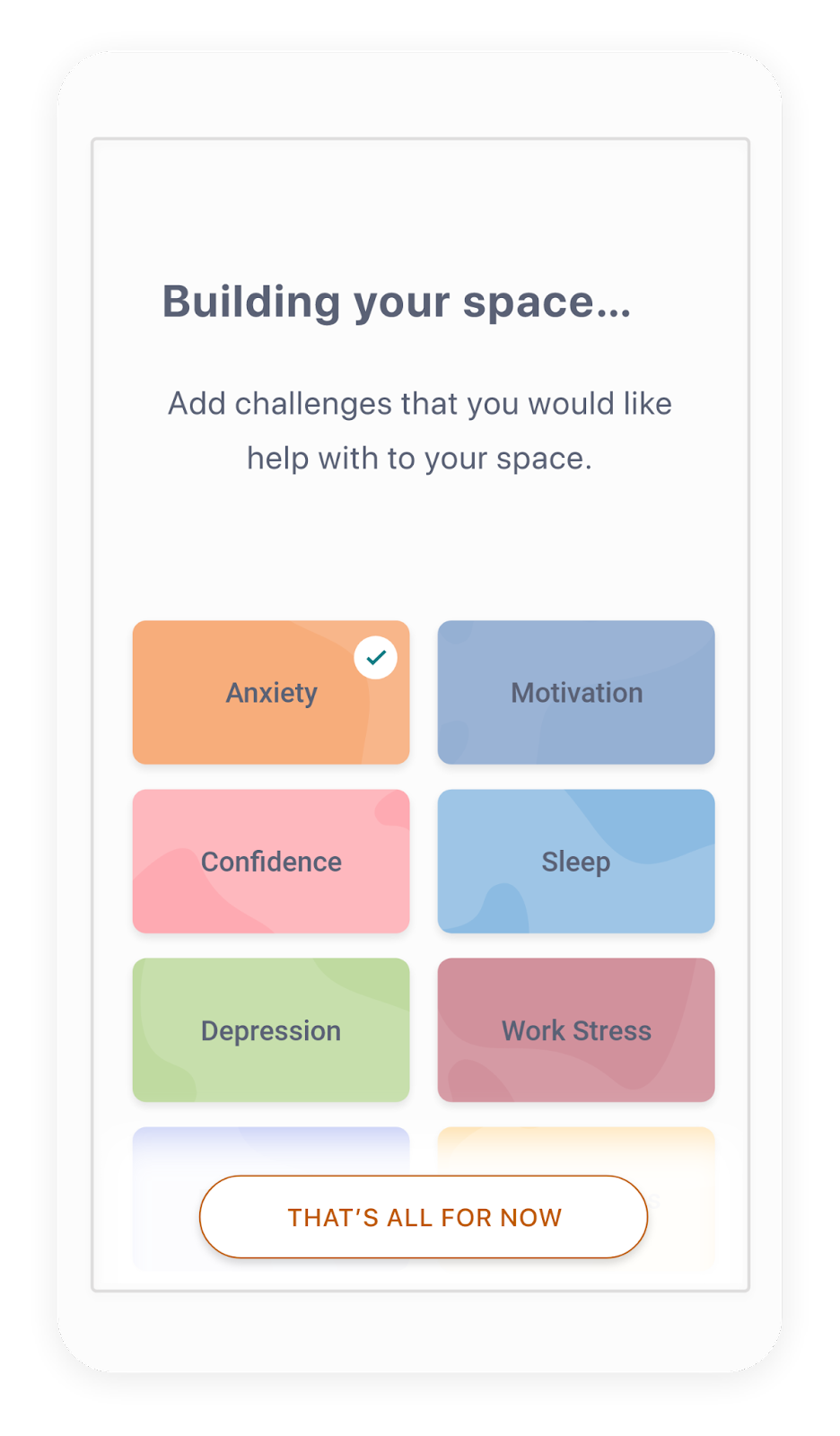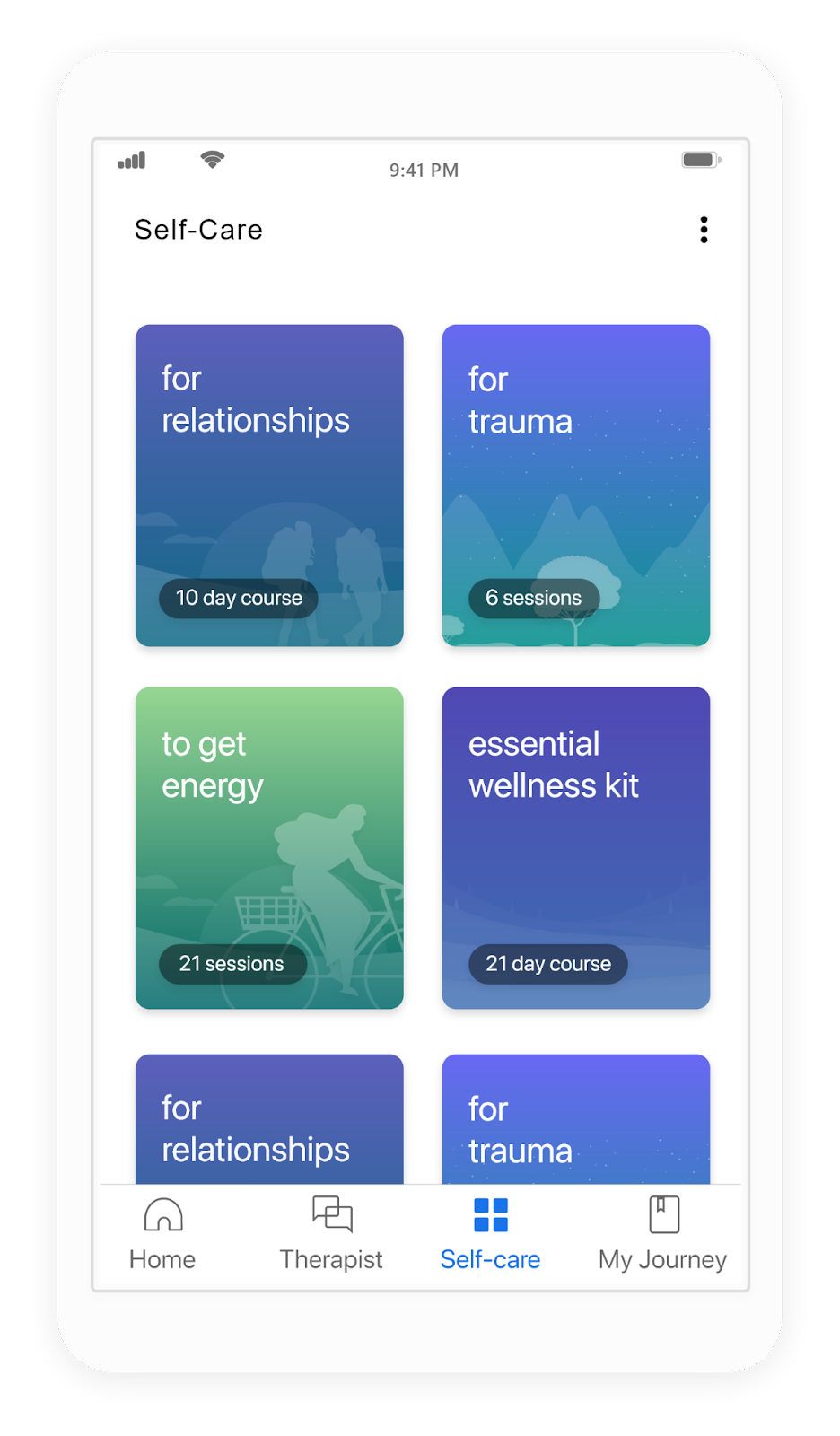Introduction
WHO defines mental health as “a state of well-being in which the individual realizes his or her own abilities, can cope with the normal stresses of life, can work productively and fruitfully, and is able to make a contribution to his or her community”. Mental health cannot be defined as a state marked by an absence of mental illness. Following this premise, mental health support is for all – everyone across this spectrum ranging from those with a clinical diagnosis needing medicalization to those experiencing emotional distress to those needing guidance with managing daily life or working towards self-actualisation.
Are traditional ways of supporting mental health care enough?
We can all agree that mental health is for all, however, the traditional ways of supporting mental health are not inclusive of everyone’s needs. The stigma around seeking help, and the shortage of professionals make it harder to bridge this gap. In-person mental health support is not replaceable, yet it cannot scale rapidly enough to address the increasing need to provide mental health support which has now increased manifold due to global crises like the covid-19 pandemic.
In a study compiling initial observations around the usage of digital mental health services, from multiple digital service providers during the covid-19 crisis, most participating service providers reported a sudden rise in the use of digital mental health services. For Wysa, there was a 77% increase in new users in the period between February to March 2020, as compared with the same period in 2019. Users reported feeling supported and continued returning to Wysa to manage their distress in this difficult time. Wysa and other participating digital service providers reported a diverse range of mental health concerns like health anxiety for self and loved ones, dealing with grief and loneliness, and worsening of symptoms for existing mental health conditions. A recurring observation is that the demand for digital mental health support has risen and that the nature of this demand has also changed since COVID-19, with an apparently increased presentation of anxiety and loneliness1

Protocols governing access for telepsychology services may be a barrier for early/timely mental health support.
A wide range of digital mental health interventions have been developed over the past 25 years and are inclusive of both synchronous and asynchronous telepsychology services delivered via audio and/or video modalities. These services are being offered by various public and private health care organizations across the world to try and bridge the service provider gap and to increase the accessibility of services, yet most services warrant a diagnosis or in-person contact or a series of assessments for end-users to qualify for access to these services. Such e-mental health services were still out of reach for those struggling with distress, though not as a symptom of a mental illness, or those waiting in long queues for assessments that would qualify them for receiving mental health support. Others barred from access include those patiently waiting to be matched with a provider within their insurance network as these providers have burdened themselves and have long waitlists.
A rapid rise in the development of more innovative digital applications to help individuals with or without mental health illnesses to improve their mental health has been seen in the past few years. There are apps that help practice mindfulness to promote well-being, help an individual to track and improve their mood, or those that have games one can play on one’s phone; these help with distraction from ruminating thoughts and create more rewarding and positive experiences. There are also apps that help with screenings and assessments for current levels of distress or emotional state and provide psychoeducational resources to be able to plan the next steps for themselves.
Wysa’s Birth and Evolution
Wysa’s founder Jo Aggarwal battled depression, after the failure of her first attempt at launching a product, and was fraught with self-doubt and struggles. Multiple self-report screenings for depression and anxiety revealed a potential diagnosis of moderate to severe depression. She tried free online peer-to-peer platforms and e-learning resources like i-cbt modules for self-help. The CBT techniques seemed to help but felt like a lot to navigate through these i-cbt modules. She did not feel as engaged with these interventions even though they seemed helpful. What seemed to be missing in these various webs or app-based tools, was the ability to make someone feel heard and validated and at the same time make personalized recommendations or signposting to the right resources.
Insights from Jo Aggarwal’s own experience with managing depression kickstarted the development of an app that was (AI)-enabled, powered by an empathetic chatbot offering a safe space to seek mental health support and access to evidence-based psychological tools that could be accessed even at 3 am in the night. This app was named Wysa, or a wiser version of Eliza, the first chatbot created by Joseph Weiznbaum in 1966. It was launched in 2016 with a mission to solve accessibility for mental health support at scale, augmenting existing mental health services, and providing an engaging and personalized way of receiving mental health. Studies have validated this thought process as a recent report by Oracle found that 82% of people would prefer [AI] robots over humans to support their mental health..
Could a blended model for mental health support help solve concerns around accessibility and offering personalized precision care?
Wysa’s focus is on the ‘missing middle’ of mental health – a space where all of us have been at some point in time, where mindfulness apps feel inadequate but our emotional distress arising from difficult experiences or automatic core beliefs, or low resilience levels may not yet warrant the need of psychiatric or medical intervention.
Wysa has offered stigma-free mental health support to 10 million+ lives in almost 65 countries. Wysa‘s service model can be best visualized as early-stage mental health support being delivered via a unique 3-layer ‘pyramid of care’, based on an anonymous, text-based app interface that can create custom care pathways driving precision care and engagement across the mental health needs continuum. The model helps users get help through:
- An emotionally intelligent AI-CBT delivering a conversational agent to provide immediate 24X7 support.
- A library of evidence-based self-help tools and techniques to work through challenging periods of their life.
- Escalation into human-led services for further support, triaging to professional clinical and counseling psychologists. With the aim of enhancing Wysa’s helpfulness and providing more support to those who need it, there is a team of qualified mental health professionals offering safe and anonymous mental health coaching via text, who have completed more than 10,000 therapy sessions in the past 3 years with a 95% client approval rating.
This blended care model is affordable (cost of triage can be 90% lower), scalable (we already support a 4 million user base), and flexible to integrate with existing service ecosystems; and hence is very suitable for early-stage intervention, at a population level.
Wysa has also been well received as a public health solution.
To share an example of such an adoption, Wysa has been integrated with the mental health platform, mindline.sg, run by the Ministry of Health Transformation, Singapore. As a government agency, they had access to various useful and helpful resources that could help their citizens but the challenge was in providing a seamless experience to citizens, where they can feel heard, validated, and get access to the most relevant resource easily.
This is where Wysa came in and helped provide a safe space for people to vent and get signposted to the right resource, it also recommended just-in-time support tools like mindfulness-based meditations, breathwork exercises, or cbt exercises to help reframe difficult thoughts. Dr. Robert Morris, the Chief Technology Strategist, at the Ministry of Health Transformation Office said “We are often inundated with information when all we really need is a chance to be listened to. Think of this as a constant companion and trusted friend, who listens to us and guides us through our challenges in a privacy-preserving & non-judgmental manner. If needed, it will guide us on how to reach out for help.”
The AI-CBT delivering conversational agent is always accessible and offers personalized conversations, regardless of working hours or any other physical barriers to access.
The assumption is that quicker access to support will bring relief and enhance users’ quality of life, as they will feel supported in addressing the original issue, avoid any potential negative experiences or emotions associated with a long wait for care or with the discomfort with traditional methods of delivering care.
The users also receive weekly reports based on the assessments and conversations they may take on Wysa. These can help them track their progress and stay motivated to continue to engage with Wysa for their emotional concerns and practice skills that help lead to building resilience. We have partnered with some leading employers, insurers and health care provider organizations like Accenture, Aetna, and Swiss Re to help their employees or members get mental health support, learn skills to build resilience, and also help employers create happier, safer workspaces for their employees. Population-based insights are gathered anonymously on various parameters around how employees are engaging with Wysa. Concerns they are bringing in help us design more effective and customized ways to engage with the employees on a regular basis, leading to desired outcomes for our partner organizations.
Challenges
Ensuring trust and safety
Digital mental health interventions can help, but one of the biggest challenges is engaging the users to make use of these interventions enough and as intended, so that they can have desired outcomes for the user. This engagement is most impacted when service users find it hard to trust a service or feel safe while using it. To ensure clients trust Wysa and feel safe while using its services, we have tried our best to be transparent while drafting our privacy policies and terms and conditions as well as inculcate HIPPA, GDPR and ISO requirements.
ORCHA, the World’s leading health app evaluation, and advisor organization have awarded Wysa an overall rating of 93%, including a 100% on clinical safety. Orcha has also recommended Wysa as the best app for coping with Covid-19-related stress and anxiety. Wysa is completely anonymous and complies with NHS’s DCB 0129 standards for clinical safety.
Ensuring context driven precision care
In addition to trust and clinical safety, precision engagement has been one of Wysa’s main driving values. A systematic review done to study factors impacting and facilitating user engagement with digital mental health interventions revealed that contextual factors related to the end-user, the program or content offered by the intervention, and the technology and implementation environment are important determinants impacting acceptability and usability of digital mental health interventions. This review further revealed that the main barriers to engagement identified in this review were:
- severity of the mental health issues
- technical issues and
- lack of personalization with regards to content and techniques suggested in the app.
Factors facilitating engagement were identified as:
- social connectedness facilitated by the intervention
- any data or report shared from app usage that increased insight about one’s own mental health and
- feeling empowered or being in control of one’s own health2.
Wysa aims to provide AI-enabled unique support to all its users, such that they find the same comfort, support, and use that we do when meeting a therapist in person yet does not follow a one size fits all approach. Wysa, using its custom AI models, is moving into more precise applications for public health. The aim is for users to find an ecosystem designed to support their specific needs. To this extent, patents have been filed by Wysa’s team of researchers and developers that are oriented to improving the precise nature of interventions, increasing engagement and thus adherence- leading to better outcomes.

Ensuring helpfulness of content and recommendations
Content and recommendation suggestions can soon get redundant and repetitive and with an ever-growing user base it can be hard to make every user feel heard, supported and safe thus could impact engagement. Wysa has a data set of over 100 million messages from conversations between Wysa and 4 million users from 65 countries. The training datasets for Wysa’s AI use at least 10,000 relevant conversations for any new natural language model and an independent 5,000-10,000 for a validation set. We also ensure that the data for both sets are pulled from different time zones across the world, ensuring diversity of input in our training and validation sets. Each of Wysa’s AI models is validated on at least 10,000 records that are manually tagged and not a part of the training set.
We are continuously running tests for appropriateness, empathy, and the presence of triggers in cases of misdirection or misdetection and use this data to inform our listening algorithms, rules engine, and content library. Wysa is improving its detection of mood incongruence to better understand a user’s needs, and help guide their journey in a more informed and effective manner. We are seeking a patent for this model as well. This is an ongoing process and has led to more than 778 iterations of our app so far. To ensure clinical safety and helpfulness, especially those around clinical or critical scenarios like depression, anxiety, trauma, etc, conversational scripts were drafted with inputs from focused group discussions with people with lived experiences, in-house therapists, and Wysa’s board of clinical advisors. Each user review contributes to Wysa’s ongoing efforts at improving its listening and personalized recommendation engines.
Ensuring presence of a therapeutic alliance
A very relevant question is often posed by both users and providers, especially those still hesitant to try out more advanced digital mental interventions– whether people could experience a similar connection with an AI conversational agent as they felt with a human therapist? The therapeutic alliance is one of the major factors impacting adherence to therapy and therapy outcomes. We have been able to create our own AI-based model that is able to detect the degree of the therapeutic alliance at any point during the conversation and flag any issues earlier, to repair and recover within the conversation, before the user withdraws completely. This is also one of the 3 patents we have filed. From recent research carried out to see if a therapeutic alliance was being established between the AI conversation agent and Wysa users, results revealed that users were able to establish a therapeutic alliance with the conversational agent Wysa and the bond levels increased over time and were comparable to the therapeutic bond levels in human delivered face-to-face psychotherapy with clinical populations3.
Ensuring research driven solutions
Wysa is currently running clinical trials with Harvard Medical School, Washington University, University of New Brunswick, Columbia, and the NIHR in the UK, to study Wysa’s usability and effectiveness in managing mental health concerns like depression and anxiety for various cohorts like young adults, people with chronic pain and patients waiting to be assigned to a mental health care provider in a public health care setting.
Wysa also recently won the NHS NIHR AI Award5, funded by the NHS (London), which aims to accelerate the testing and evaluation of AI technologies in the NHS so patients can benefit from faster and more personalized diagnosis and greater efficiency in screening services4. The aim is to reduce the burden of care on providers and reduce wait times and barriers to mental health support when it’s most needed for those needing it the most. Wysa is the first and only digital mental health solution awarded under this scheme, and allows the writing of patient information into the NHS Electronic Health Record (EHR).
Wysa’s efficacy for managing depression has been established through a peer-reviewed study published in JMIR, the world’s top e-health journal. This study demonstrated how digital mental health apps could act as a supplementary intermediate support system. The high engagement users of Wysa had significantly higher improvement in depression compared with the low engagement users group indicating promising results on the effectiveness of Wysa6.

A pilot feasibility study was conducted recently, with the primary objective of studying the feasibility of introducing a digital mental health intervention (Wysa) within an outpatient orthopedic setting to patients with chronic pain and coexisting symptoms of depression and/or anxiety and to assess the preliminary effectiveness of this intervention, as a secondary objective. Results revealed that Wysa had a high engagement and retention rate and users with high engagement with Wysa showed a reduction in their scores on anxiety and depression. At a two-month follow-up participants using Wysa also showed improvement in Pain Interference and Physical Function to a clinically meaningful degree7. This was a very reassuring piece of research reiterating that delivery of a digital mental health intervention within the context of chronic pain and potentially other chronic health issues is feasible and could have an impact on public health systems grappling with costs and efforts associated with the burden of care.
Future Plans
For this year our focus is to create CBT based clinical programs delivered via AI to serve individuals with specific concerns of worry, anxiety, depression, social phobia, substance use, and maternal health concerns. We are developing these programs with guidance from leaders in mental health associated with the NHS. We are also working on translating Wysa into different languages to increase its accessibility for non-English speakers , also for those residing in remote geographical locations with low internet bandwidth as well as low tech literacy. We’re beginning to release a version of the app in Spanish and initiating work on a version in Hindi. The focus would also be to bring in more rigor, do more efficacy and outcomes focused research, enhance our precision engagement models and build more partnerships with a common mission to offer scalable, accessible, safe, customized mental health support to individuals in our communities, and workspaces and in health care settings.
References
- Inkster, B., O’Brien, R., Selby, E., Joshi, S., Sjbramanian, V., Kadaba, M., … & Mateen, B. A. (2020). Digital health management during and beyond the COVID-19 pandemic: Opportunities, barriers, and recommendations. JMIR Mental Health, 7(7), e19246
- Borghouts, J., Eikey, E., Mark, G., De Leon, C., Schueller, S. M., Schneider, M., Stadnick, N., Zheng, K., Mukamel, D., & Sorkin, D. H. (2021). Barriers to and Facilitators of User Engagement With Digital Mental Health Interventions: Systematic Review. Journal of medical Internet research, 23(3), e24387. doi.org/10.2196/24387
- Beatty, C., Malik, T., Sinha, C. & Meheli, S. (Under review). Evaluating the Therapeutic Alliance with a Free-text CBT Conversational Agent (Wysa): A Mixed-Methods Study.
- nihr.ac.uk/news/new-wave-of-ai-technologies-in-36-million-funding-boost/27867
- Inkster B, Sarda S, Subramanian V. An Empathy-Driven, Conversational Artificial Intelligence Agent (Wysa) for Digital Mental Well-Being: Real-World Data Evaluation Mixed-Methods Study. JMIR Mhealth Uhealth. 2018;6(11):e12106. Published 2018 Nov 23. doi:10.2196/12106
- Sinha C, Cheng AL, Kadaba M Adherence and Engagement with a cognitive Behavioral Therapy Based 5onversational Agent (Wysa) in Adults with chronic Pain: Survival Analysis JMIR Preprints 15/02/2022:37302












